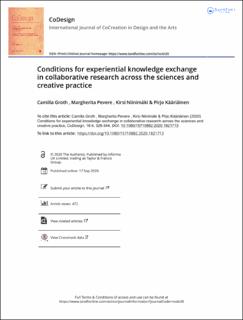| dc.contributor.author | Groth, Camilla | |
| dc.contributor.author | Pevere, Margherita | |
| dc.contributor.author | Niinimäki, Kirsi | |
| dc.contributor.author | Kääriäinen, Pirjo | |
| dc.date.accessioned | 2020-12-22T10:25:40Z | |
| dc.date.available | 2020-12-22T10:25:40Z | |
| dc.date.created | 2020-12-18T09:39:18Z | |
| dc.date.issued | 2020 | |
| dc.identifier.citation | Groth, C., Pevere, M., Niinimäki, K., & Kääriäinen, P. (2020). Conditions for experiential knowledge exchange in collaborative research across the sciences and creative practice. CoDesign, 16(4), 328-344. | en_US |
| dc.identifier.issn | 1571-0882 | |
| dc.identifier.uri | https://hdl.handle.net/11250/2720741 | |
| dc.description.abstract | Interdisciplinary research across the sciences and creative practice offers potential to explore new areas of knowledge previously hidden between disciplines. However, diverging epistemology and expectations make collaboration difficult. We interviewed 11 researchers working in projects that combined scientific and creative practice research, to investigate how they dealt with different epistemological approaches. In some cases, the discrepancies that were first experienced as hindrances turned into enablers, opening up new vistas for learning. Our findings show that the prerequisites for experiential knowledge transfer need to be built consciously by engaging in handson practices and shared cognitive activities that may extend beyond the personal comfort zone. Furthermore, the common goals and research questions need to be motivating for all involved. Although academic research funding agents encourage interdisciplinary research, funding alone is not sufficient to motivate people to work and truly learn together. By combining different types of knowledge in co-creation processes, participants are able to better share each other’s views and construct a multifaceted understanding. An analysis of the interviews suggests how a conscious development of interdisciplinary practice helps educate thinkers and makers to feel comfortable in the unsettling zone between disciplinary boundaries, and thus contribute to innovative research. | en_US |
| dc.language.iso | eng | en_US |
| dc.rights | Attribution-NonCommercial-NoDerivatives 4.0 Internasjonal | * |
| dc.rights.uri | http://creativecommons.org/licenses/by-nc-nd/4.0/deed.no | * |
| dc.title | Conditions for experiential knowledge exchange in collaborative research across the sciences and creative practice | en_US |
| dc.type | Peer reviewed | en_US |
| dc.type | Journal article | en_US |
| dc.description.version | publishedVersion | en_US |
| dc.rights.holder | © 2020 The Author(s). Published by Informa UK Limited, trading as Taylor & Francis Group. | en_US |
| dc.source.journal | CoDesign - International Journal of CoCreation in Design and the Arts | en_US |
| dc.identifier.doi | https://doi.org/10.1080/15710882.2020.1821713 | |
| dc.identifier.cristin | 1861394 | |
| cristin.ispublished | true | |
| cristin.fulltext | original | |
| cristin.qualitycode | 1 | |

